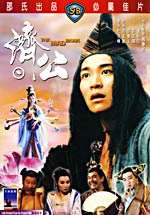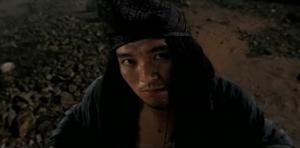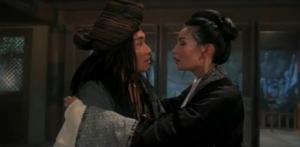
Rating:
5
Year of release: 1993
Genre: comedy
Director: Johnnie To
Action director: Ching Siu-Tung
Producer: Mona Fong
Writer: Sandy Shaw
Cinematography: Horace Wong
Music: William Hu
Stars: Stephen Chow, Maggie Cheung, Paul Chun Pui, Anita Mui, Ng Man Tat, Anthony Wong, Kirk Wong, Wong Yat-Fei
Rated IIB for crude humor and language
VCD Information
Company: Celestial
Format: widescreen
Languages: Cantonese, Mandarin
Subtitles: Chinese/English (electronically printed on the lower black bar)
Extras: trailers
Notes: A good VCD picture and sound-wise, but the subtitles could use some work.
Movie Review Index / Main Page
The Mad Monk

The Mad Monk is one of the lesser-known entries in Stephen Chow's filmography, and for good reason. It's not a horrible movie - in fact, it offers up a fair share of chuckles during its' running time - but it's nothing memorable. During the running time, the viewer tends to get the feeling that everyone involved, especially Chow, was just coasting around, with little real interest into creating a movie rather than a quick paycheck.

Chow plays his usual "talented but still a smartass" role. This time out, he's the Dragon Fighter god Lo Han, whose antics have angered the other gods enough that they sentence him to be reincarnated as an animal. But the Goddess of Mercy (Anita Mui) takes pity on Lo Han, and makes a deal with him. If Lo Han can go to earth and changes the lives of three people (Maggie Cheung, Anthony Wong and Kirk Wong) without using any of his powers, Lo Han will be allowed back into heaven. With a couple of sidekicks (Ng Man-Tat and Wong Yat-Fei) in tow, Lo Han heads to earth - but He Lo-Shan, an evil demon, has some other plans for him that might throw the plan into jeopardy.

A big reason behind Stephen Chow's success is his ability to somehow wrap up the disjointed "moy len tau" style into a cohesive unit. Unfortunately, The Mad Monk is one of the few times in his comedic career where this simply does not happen. It's not due to the use of Cantonese puns or Chinese religious symbolism - though both things figure heavily into the film. Rather, there is not the one point of focus (usually a love interest) that keeps things on track. There's simply too many characters and too many subplots for the average viewer to keep track of. I'm not saying that movies should be "dumbed down", but sometimes film-makers have to know when to say when. Chow and company attempt to do way too much with the story here, and thus lose the viewer in the process. This one's recommended for die-hard Chow fans only.